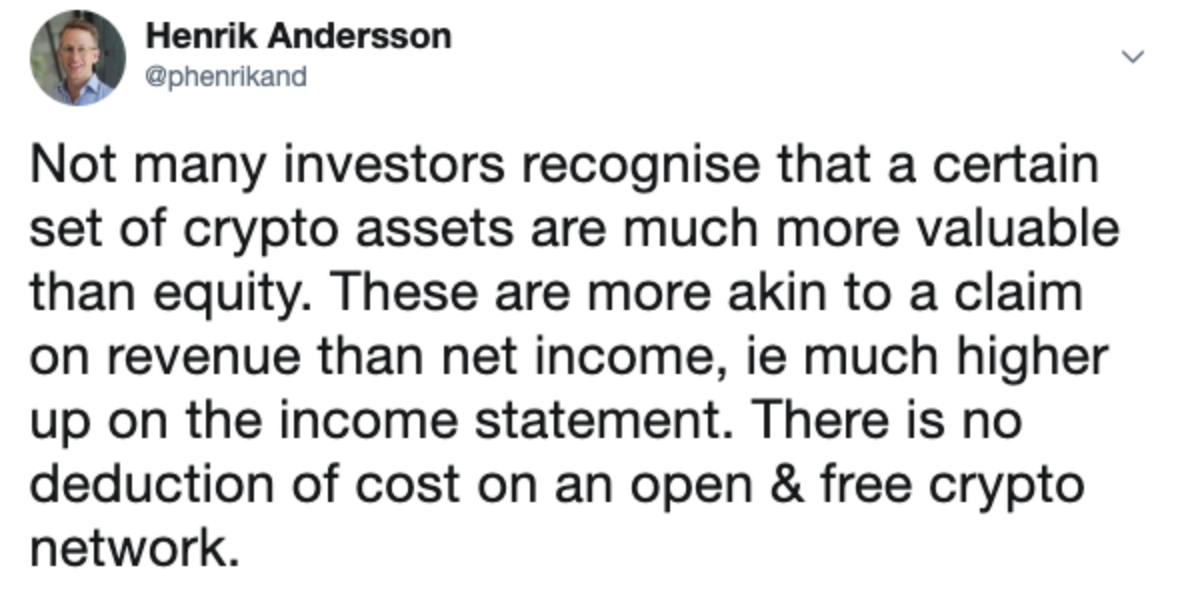categories
All Categories
- Bitcoin
- Centralised Exchanges
- Crypto
- Crypto Asset Volatility
- Crypto Correlations
- Crypto Governance
- Crypto in the Portfolio
- Crypto Valuations
- DeFi
- ESG
- Ethereum
- Investment Highlight
- Regulation
- Security and Privacy
- Social Media Influence
- Stable Coins
- Traditional Finance and Crypto
- Uncategorized
- UNSDG
- Web 3.0
Authors
All Authors

Why Crypto Assets Can be More Valuable than Equity
by Henrik Andersson
We often hear that crypto assets are not equity and therefore not valuable as an investment — i.e. they are great for the issuers as they don’t dilute shareholders. This is not necessarily the case.
Let’s have a look at Binance, whose CEO Changpeng Zhao in a recent interview said he believes their token Binance Coin might be more valuable than their equity. Simplifying somewhat, the company makes money by charging a commission on trades. The equity is a claim on the net profit, after all costs associated with running the exchange, all technology, marketing and personnel cost and so on. The company can choose to reinvest the profit or distribute that to its shareholders. The token, Binance Coin, gives you a discount on the trading fees on Binance. If the discount is 50%, all else equal, then half of all value should be captured in their token, less will flow down to shareholders. If the discount was 100% then no value would be captured by shareholders and everything would flow to token holders. The token holders thus capture value higher up the income statement.

Binance is disintermediating the company Binance in favour of Binance Coin.
With Bitcoin there are no shareholders, no CEO, no board of directors. All value is captured in the token, lower case bitcoin. The people working ‘for Bitcoin’ are mostly volunteers contributing to the open source code. There are some exceptions, the for profit company Square recently announced they are hiring Bitcoin and crypto engineers to contribute to the project.

The crypto landscape has seen the emergence of a new a kind of organisation not driven by shareholders but by a team working on a common project where the economics are centred around a crypto asset. Take MakerDAO as an example. MakerDAO is a decentralised lending facility on top of Ethereum. There is a not-for-profit foundation behind MakerDAO that can sell Maker tokens (currently in the top 20 of crypto assets) to finance the development of the MakerDAO system. The Maker token derives value from users borrowing money through ether collateralised loans — interest payments is made in the Maker token. Thus the Maker token is another example of a top income statement claim. There are no cost items that the Maker holders have to pay before realising value. That’s not a coincidence. The economics of crypto projects are driven by:
-
Open source. These projects need to be open source, otherwise they wouldn’t be ‘trustless’. If they were not trustless, they wouldn’t need to be built on a blockchain to start with. Unnecessary rent seeking in the open source protocol, will lead to a fork — someone will fork out the excess protocol level taxation.
-
All value captured in the token. Since any other value-capture can be forked out, there is no value left for profit seeking shareholders.
In the brave new world of crypto, we see that shareholders are replaced by token holders. Employees are replaced by volunteers, grants or paid-in-token by the protocol contractors. The token becomes a measurement of success, the employees of Binance want to get paid by Binance Coin. The founder of MakerDAO lives and dies by the success of Maker, the token.
In the next bull market, we believe Bitcoin will surpass the market cap of the largest company in the world. I.e. crypto networks can be bigger than a single company and crypto assets can be more valuable than equity. It is definitely not the case for all crypto assets, only the most well built crypto networks adhere to the success formula described here. It’s our job at Apollo Capital to find these diamonds in rough.
Disclosure: Apollo Capital is a holder of Bitcoin, Binance Coin and Maker.